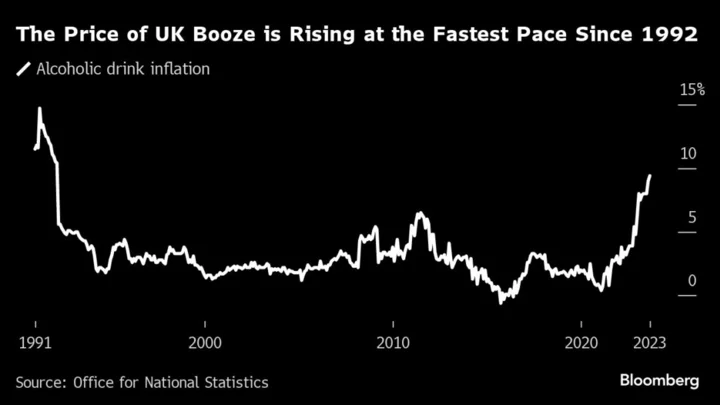Every Thursday, Watling Street teems with so many bankers and lawyers sipping on pints of beer that it’s almost impossible to walk up the lane in the City of London financial district. Most other nights, though, it’s almost empty as workers cut back amid a cost of living crisis that’s left two-thirds of UK adults spending less on non-essentials.
“We can’t help you pay the bills but we can help you forget about them,” reads the sign outside Core, a pub on the thoroughfare offering 50% off drinks from 4pm to 9pm each night to tempt people to the hostelry. On Wednesday, most of the tables in the bar were occupied. Elsewhere, it was quiet.
The street’s fortunes reflect wider problems in the pub industry as taxpayers tighten their belts after real earnings fell when inflation spiked after the pandemic. Consumer price increases remain stubbornly high, a headache for Prime Minister Rishi Sunak ahead of a potential election next year. Alcoholic drinks inflation is especially elevated, rising to an annualized 9.4% in September, the highest rate since 1992.
The pullback by consumers has left many businesses across the economy struggling with higher expenses, weaker demand and the rising cost of credit. As a result, the number of firms in significant financial distress is surging, jumping nearly 25% in just three months, according to a report by Begbies Traynor Group Plc. Bars and restaurants are among the hardest hit, the data show.
“City center pubs have suffered a lot post-Covid as everyone kept working from home,” said Radim Radkovsky, a director in the global infrastructure and finance segment at Fitch Ratings. “Turnover has been recovering but profits are still weak because of high costs.”
Trading at some pubs in the City of London neighborhood operated by Greene King is still 20% below pre-Covid levels, said Alex Dawson who runs the urban pubs unit of the company owned by CK Asset Holdings Ltd. Discounting is heavier than before the pandemic in order to remain competitive and is now offered on Fridays, which would never have happened before that, he said.
“The City is still in a quite heavy recovery mode,” said Dawson. “We’ve seen improvement post summer holidays, which has given us some confidence, but it’s certainly still skewed towards Tuesday to Thursday in terms of the concentration of traffic.” Read More: UK Alcohol Tax Drove Booze Prices Higher as Inflation Cooled
One example of the increasing use of promotions is the rise of the “Happy Hour,” which until now has not been a tradition in the City in the same way it is in Manhattan. In many pubs, it now extends to four hours or more.
A stroll around the Square Mile reveals happy-hour deals including bottles of beer for £2.50 ($3.05) at Simmons Bar, two cocktails for £10 at Forge and a glass of wine for £5 at Bar 1790. Two pints in Core costs less than £7 during the discounted period.
Core is part of TDR Capital’s Stonegate Pub Co., which is trying to raise cash to pay down existing debt after rapidly expanding to about 4,500 premises since its formation in 2010. About £2.17 billion of the operator’s bonds mature in July of 2025 amid soaring interest rates.
The chain is currently trying to raise new debt against 1,000 of the pubs, according to people with knowledge of the matter. A spokesperson for the company declined to comment.
One area where pubs are already starting to feel the impact of customers being more careful about spending is food.
Read more: What’s Really Killing So Many Historic UK Bars
“The wet-led pubs are the ones that have been faring better, because the drink sector has better margins than the food one,” Fitch’s Radkovsky said. “People are still going to pay a few pounds for a pint, but eating out became a bit more of a luxury.”’ The ratings company has negative outlooks on junior securitized debt tranches linked to Unique, a securitization of Stonegate, but the majority is currently rated stable.
With trading mixed, the industry now has two major additional concerns this year — the budget and Christmas. Pubs and restaurants usually look forward to the holiday season’s supercharged sales as they make a third of their profits between Halloween and New Year’s Eve.
“We expect and hope to have a strong Christmas,” said Phil Urban, chief executive officer of pub chain Mitchells & Butlers. “But the speck on the horizon are the train strikes, which last year wiped out a crucial Christmas week and could well do again and there’s very little the sector can do about that.”
Urban may get his wish for a solid yearend after the Rail Delivery Group said it would put a vote on a pay deal to its members in late November. Acceptance would end more than a year of disruption to commuters and visitors. Another rail union, ASLEF, is still in dispute with train operators.
Before then, Chancellor of the Exchequer Jeremy Hunt’s autumn statement will be watched closely to see whether he extends a 75% relief on business rates that pubs have been able to claim. The hospitality industry’s bill for the levy will rise by £1 billion pounds in April if the relief expires, according to Kate Nicholls, chief executive officer of lobby group UKHospitality.
That would be another blow just as deadlines to repay debt start to loom.
“There is an expectation from stakeholders to start reducing debt,” said Simon Johnson, a senior director in operational real estate at CBRE Group Inc. “If pubs cannot get sufficient cashflow from operations to service interest and debt amortization, they’ll need to consider selling assets.”
--With assistance from Irina Anghel and Gina Turner.
Author: Neil Callanan, Sabah Meddings and Giulia Morpurgo

